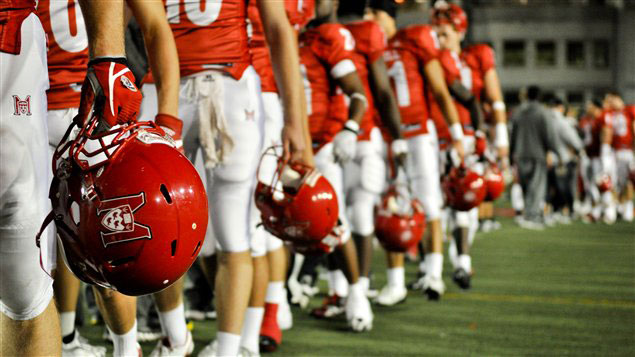The Change the Name campaign has gripped students on campus this semester, but it’s also of interest to other members of the McGill community. The McGill Tribune asked alumni for their stance on the men’s varsity teams’ name.
John Macdonald (BA ‘01, BEd ‘03)
The naming debate is very important to me. Figuratively speaking, I have a foot in each canoe. I played football for McGill from 1997 to 2001, but I am also a proud Mohawk from Six Nations of the Grand River Territory and a former indigenous education consultant.
For a long time, I had mixed feelings about the name ‘Redmen.’ I saw the potential for offence due to its archaic, pan-Indian connotation, but I also found it enchanting that it reflected my mixed Scottish and Mohawk heritage. I never loved the name, but I also chose to remain silent because I believed the damage it inflicted was miniscule. As it turns out, I was wrong.
Recently, through Tomas Jirousek’s campaign and Dr. Suzanne Morton’s research, I learned about the racialized acts of students during the ‘50s and ‘60s, such as the use of ‘super-squaws’ to describe women’s teams. The appalling use of this misogynistic and racist language on campus is a cancer of our history, and it metastasized from the name ‘Redmen.’ Removing this remnant from a dark period of McGill’s past would be a step toward reconciliation.
The elitist, self-serving, and Eurocentric banter of those who believe that the name should remain is heartbreaking. It takes an enormous lack of sensitivity to so easily dismiss the viewpoints of over 10,000 indigenous and non-indigenous community members. Equally bothersome is the rationale that because some indigenous communities and alumni use or endorse the name ‘Redmen’ and other similar names for sports teams, McGill has the inherent right to use it as well. It is universally understood that only marginalized peoples can reclaim words and names that have been used to denigrate them in the past. Finally, the fact remains that most dictionaries fully acknowledge that the word “Redmen’ is a dated, offensive term used to refer to a North American Indian. To continue to promote this word in media is not appropriate for a forward-thinking and innovative institution such as McGill..
As an Ongwehonwe person and a proud McGillian, I must say that it is time for ‘Redmen’ to fade into history. Instead, let’s move forward by collaborating to create a new name that we can all be proud of.
Salim Brahimi (BEng ‘89, MEng ‘08, PhD ‘18)
The Redmen alumni community respectfully disagrees with those calling for the Redmen name to be changed. This in no way implies that we are insensitive to the historical injustices faced by Canada’s First Nations: We are all on the same side. As alumni, we share the Working Group on Principles of Commemoration and Renaming’s commitment to taking concrete steps that will ensure that our campus is more inclusive of and welcoming to indigenous peoples.
There is no question that red is the official school colour, as reflected in the McGill coat of arms. Over McGill’s 140-year history of intercollegiate sports, the colour red has been both universal and predominant.
What has complicated the debate is that, decades ago, erroneous links were made with aboriginal connotations, including a stylized headdress logo. More than a quarter-century ago, the McGill Athletics Board corrected the error once and for all by removing the logos and any indigenous references associated with the name. The name Redmen was retained because its historical roots were neither associated with nor in reference to the indigenous community. It was intended to mean “Men in Red”— and that is exactly what it means today.
I fully understand that some members of the indigenous community take offence to the name. However, this perception is not universal, as Redmen alumni with indigenous roots have expressed their pride in the Redmen name and opposed changing it. Other indigenous leaders have expressed that they are not offended by the name.
To us, ‘Redmen’ represents family. Redmen team members share a bond through the decades of perseverance, sacrifice, camaraderie, friendship that are integral to the McGill experience. If the name is changed because it is mistakenly perceived as having a pejorative connotation, that would be wrong, because it would falsely paint the Redmen alumni who support keeping the name as racist. Nothing could be farther from the truth.
It is my sincere hope that the University will permit both sides to explain their position, and that the entire McGill community will seize this opportunity to turn a potentially divisive topic into a unifying, inclusive initiative and to take concrete action called for by the by the Truth and Reconciliation Commission of Canada.










It isn’t clear from what authority Mr Brahimi is drawing to speak for all alumni: does he have an official role, or a comprehensive survey of alumni attitudes? I’m not being sarcastic, it seems like there’s an author bio missing.
Either way, he is factually correct in everything he’s said and completely wrong in his conclusion. It doesn’t matter where the name came from originally. It is inarguable that it was interpreted relatively early on as referring to First Nations peoples by the members of the team and the people that had authority over the teams and their branding. That association is going to keep happening, because reasonable people, knowing nothing about the team, will come to that conclusion on their own. The name is irrecoverably tainted, partially from happenstance and ill-luck, but mostly because of actual decisions made by the athletics department and their supporters. It should be retired.